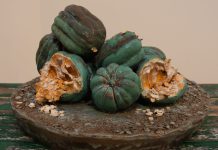Andy’s Orchard in Morgan Hill delivers perfect fruit
By Tony Burchyns Staff Writer
Morgan Hill – Office work just didn’t sit well for Andy Mariani. But as the youngest of three brothers in a family of fruit growers, his parents wanted him to venture into the world and find a career.
“It was clear the farm couldn’t support three families,” explained Mariani, 60, strolling through the full green trees of Andy’s Orchard, the business he’s now pouring his heart and soul into.
It’s a natural fit for the easy-going, fresh-air-loving Mariani, whose first job after earning a master’s degree in public administration in the late 1960s was working as the assistant city manager of Saratoga.
“I did that for one, kind of, very difficult year,” Mariani laughed. “I knew right away I wasn’t cut out to be a person who was satisfied with an office job.”
Life can be a convoluted journey. And to make matters worse, young Mariani soon contracted a rare skin disease called pemphigus vulgaris, which required years of treatment at Stanford Hospital.
It was a tough ordeal, “But I ended up back on the farm,” Mariani said. “I think that was probably one of the best things that could have happened to me, because this is where I felt I belonged anyway.”
And there he stayed.
For the last two-and-a-half years, Mariani has operated Andy’s Orchard in Morgan Hill, where he continues to grow and sell succulent old-world varieties of fruit his family has cultivated for years. But he’s taken that tradition in new direction, marketing his apricots, prunes, cherries, peaches, prunes and nectarines directly to consumers who visit the orchard’s store and take tours of the beautiful 30-acre patch of agricultural paradise on Half Road his parents purchased in 1957.
Upon his return, Mariani helped his brothers with the operation. Later on, after one brother left, and the other semi-retired, he took over the main part of the farm.
Intrigued by the burgeoning “buy fresh, buy local” movement, Mariani launched Andy’s Orchard as a way of connecting urban consumers from San Jose and beyond with the wonders of local agricultural production.
“The old philosophy was to put the produce on a truck and send it to market,” he explained. “We’ve been trying to be a little more creative than that. If you cut out the middlemen, the brokers and the handlers, and everyone else that’s involved, the farmer realizes a little more profit, and the consumer gets a better deal, too.”
Most of the dollars consumers spend on produce, Mariani said, go for covering the cost of transportation, gas, packaging and storage. “The product itself is very minor compared to those costs,” he said.
But Mariani is interested in more than just the bottom line. His goal is to grow the best fruit possible, and invite customers to appreciate how the food they eat is grown.
Throughout the summer months, he hosts tastings and tours, allowing visitors to walk the land sample fresh fruit picked straight from the tree. One of the things he likes to instill in visitors is how mass-produced fruit, often trucked 1,500 miles to market, just doesn’t measure up to old varieties of the past.
“In a way, we’re selling a bit of nostalgia, some old-fashioned-type fruits that you can’t get anywhere else,” he said.
At Andy’s Orchard, fruit is picked by hand, and only when perfectly ripe. Those extra two or three days on the tree, he emphasized, make his peaches and apricots ooze with juicy flavor.
“The fruit develops, almost exponentially, its amount of sugar and flavor the last two or three days it’s on the tree,” he said. At most grocery stores, “the consumer is really getting short-changed for getting something that’s not tree ripened.”
On this fertile spread, Mariani prides himself in growing hard-to-find varieties for the “artisan” fruit consumer. One of his roughly 35 varieties of peaches is the “donut” peach, a flat peach with roots in ancient China that has only recently gained popularity in the United States.
Also available are succulent Blenheim apricots, once prevalent in California but now extremely rare because they could not be packaged as easily as the Patterson apricot, a tougher breed that lacks the same quality of flavor.
“The trend has been fitting the fruit to the distribution system, rather than trying to adapt the distribution system to fit the fruit,” Mariani explained.
In fact, just about every type of popular fruit has been altered for the market.
“At one time,” Mariani continued, “they packed cherries one by one in rows. I mean, this is all obviously labor-intensive, but that was the best way to ship way back then. Now, they’re just put loose in a box, they’re hydro-cooled, they’ve got fungicide on them … and all these other things that have changed.”
For these reasons, Mariani lost interest in the fruit shipping business when he started Andy’s Orchard at an age when many of his peers were thinking about retirement. He rather enjoys sharing the intimacy of the old family, leading customers on “Harvest Walks” where they amble over the soft dirt on a summer’s day, filling up buckets with fresh fruit to take home.
It’s a lifestyle he himself has lived for most of his life, expect for that short detour into the white-collar world.
“There’s a sense of being part of the land,” he said. “I don’t think I would have been happier growing up in a city situation or a suburban situation, where there’s only a little back yard. This – it’s open.”
Tony Burchyns covers Morgan Hill for The Times. Reach him at (408) 779-4106 ext. 201 or tb*******@*************es.com.












